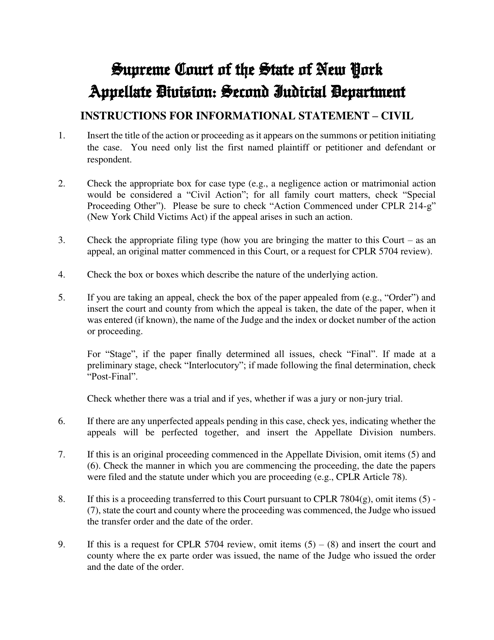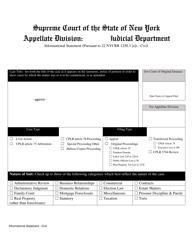Informational Statement - Civil - New York
Informational Statement - Civil is a legal document that was released by the New York Supreme Court - a government authority operating within New York.
FAQ
Q: What is civil law?
A: Civil law deals with private disputes between individuals or organizations.
Q: What types of cases fall under civil law?
A: Civil law covers a wide range of cases, including personal injury, contract disputes, property disputes, and family law matters.
Q: How is civil law different from criminal law?
A: Criminal law involves cases where the government brings charges against an individual for violating the law, while civil law involves disputes between private parties.
Q: What is the statute of limitations for filing a civil lawsuit in New York?
A: The statute of limitations varies depending on the type of case, but it generally ranges from one to six years.
Q: Do I need an attorney for a civil case in New York?
A: While it is not required to have an attorney for a civil case in New York, it is highly recommended, especially for complex cases.
Q: How long does it take to resolve a civil case in New York?
A: The time it takes to resolve a civil case can vary greatly depending on the complexity of the case and the court's schedule. It can range from months to several years.
Q: Can I appeal a civil court decision in New York?
A: Yes, you can appeal a civil court decision in New York. Appeals are filed with the appropriate appellate division of the state's Supreme Court.
Q: What are the possible outcomes in a civil case?
A: Possible outcomes in a civil case include a judgment in favor of one party, a settlement agreement, or dismissal of the case.
Q: What is the burden of proof in a civil case?
A: In a civil case, the burden of proof is usually the preponderance of the evidence, which means that the evidence must show that it is more likely than not that the claims are true.
Form Details:
- Released on October 16, 2019;
- The latest edition currently provided by the New York Supreme Court;
- Ready to use and print;
- Easy to customize;
- Compatible with most PDF-viewing applications;
- Fill out the form in our online filing application.
Download a fillable version of the form by clicking the link below or browse more documents and templates provided by the New York Supreme Court.















